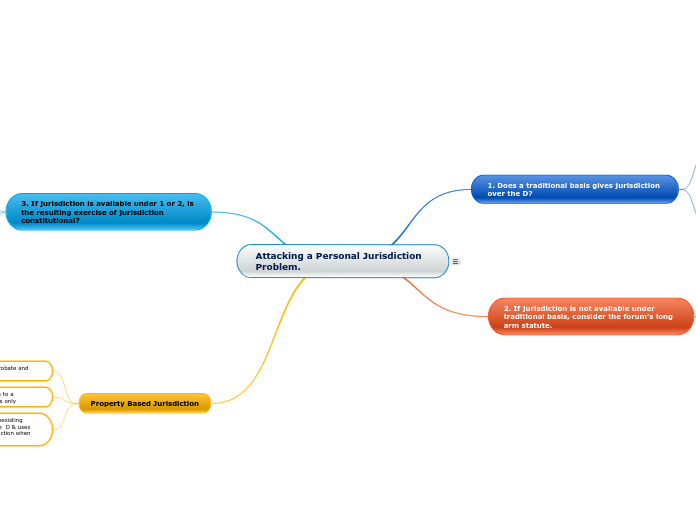Attacking a Personal Jurisdiction Problem.
1. Does a traditional basis gives jurisdiction over the D?
a. Natural Persons
i. Was the D served with process in the forum?
ii. Is the D a domiciliary of the forum?
iii. Did the D consent to jurisdiction?
b. Corporations
i. Is the D incorporated in the forum?
ii. Is the D doing business in the forum?
iii. Did the D consent to jurisdiction?
2. If jurisdiction is not available under traditional basis, consider the forum's long arm statute.
a. If it is a CA-style statute proceed directly to the constitutional question (item 3)
b. If it is an Enumerated Act statute, does one of its sections apply here?
3. If jurisdiction is available under 1 or 2, is the resulting exercise of jurisdiction constitutional?
a. Does the D has minimum contact with the forum?
i. Are the D's contacts sufficient to support the exercise of general jurisdiction?
ii. Are the contacts relied upon to support jurisdiction those of the D or her agent?
iii. Could the D anticipated being "haled into court" in the forum?
iv. Did the out of state D initiate the contact with the in state P or vice versa?
v. Did the D purposefully establish contacts with the forum?
vi. Did the D product enter the state as part of a substantial stream?
b. Is the exercise of jurisdiction fair or reasonable?
i. will the burden on the D be severe?
Does the forum has an interest in adjudicating the case?
iii. Does the P has a convenient alternative forum for the claim?
iv, Will the jurisdiction further the inter-state judicial system's interest in the efficient resolution of controversies?
v. Will jurisdiction advance the shared interest of the several states in furthering substantive social poilicies?
Property Based Jurisdiction
in rem admiralty, forfeiture, eminent domain, probate and land title registration
quasi-in rem - the P asserts a preexisting claim to a particular thing against certain named individuals only
attachment jurisdiction - P does not assert a preexisting claim of ownership but a personal claim against the D & uses the property as a device (hostage) to obtain jurisdiction when personal jurisdiction over the D is unavailable
Pennoyer v Neff
